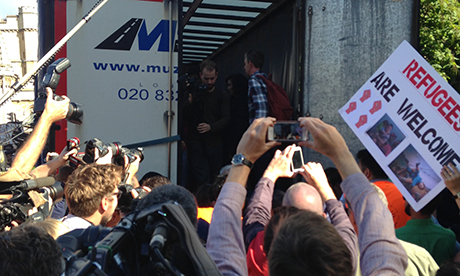Refugee services in Hackney struggling with cuts and rent hikes

Recent protests called for much-needed funds. Photograph: Aella Jordan Edge
Last September when Mayor Jules Pipe called on the UK government to “step up” its response to the international refugee crisis, he emphasised Hackney’s tradition of welcoming vulnerable new arrivals.
That tradition looks to be in good shape, with a campaign well underway for Hackney to designate itself a ‘sanctuary borough’. Hackney Migrant Centre reported being “inundated” with offers of help.
But recent changes in the borough are placing limits on its ability to provide support for refugees and asylum seekers, according to voluntary groups working with vulnerable new arrivals. Gentrification and funding cuts threaten the structure that underpins Hackney’s welcoming culture.
Ali Aksoy is the director of the Hackney Refugee Forum (HRF), an umbrella organisation for over 40 groups working in the borough.
The HRF used to be an independent organisation but funding cuts from 2009 onwards forced it to merge with HCVS. Its funding halved in the period, to just under £40,000.
The number of groups in the network has also declined, Aksoy says: “There were over 90 groups in 2009. Now we’re down to 40.”
Funding cuts have often matched or outpaced Hackney’s ever-rising rents. “In 2010 and 2011 it was much cheaper,” recalls Aksoy. “Now it’s getting more expensive.
“Turkish and Kurdish organisations moved out of Hackney because of rising rents.”
Having groups that cater to specific communities is helpful because it keeps language problems to a minimum. The UK’s immigration system is complex and many refugees need help navigating it. ‘Signposting’ – helping refugees access services and benefits they might be unaware of or wary of tangling with – is, according to Aksoy, the most important thing the groups in his network do.
“One of the main issues for refugees and migrants is accessing information on available services,” he explains. “The reason is language and not knowing how the system is working, and also reluctance to approach authorities because of experiences in other countries.”
As well as practical support, HRF’s groups provide an anchor for their communities, but this too is under threat from rising rents.
HRF is able to pay to hire church halls or empty gyms for specific events – English classes or job-hunting support, for example – but there is no scope for the long-term funding of social centres for different communities.
Long-term support needed
It’s a similar story over at the Refugee Women’s Association (RWA) in Dalston, which helps female refugees access support and provides them with training, including English language lessons.
Director Simin Azimi points out that gentrification is one of the greatest challenges facing refugees in the borough: “Accommodation is becoming difficult to find, and some of the homeless clients that we deal with are being sent to other boroughs.”
Changes to immigration status affect rights including entitlement to different types of benefits and accommodation and how these are funded. A government decision on someone’s status, which may take years to come, causes drastic and sudden upheaval when it arrives.
Azimi cites a recent case in which the nearest accommodation offered to one of her clients was in Lewisham.
She managed to intervene on the grounds that there was only scant assistance available in Lewisham in the client’s native language, and managed to secure relocation to Barnet instead – still many miles from the Hackney community into which the client had begun to settle over the previous years.
Much of the RWA’s work is aimed at helping refugee women stand on their own feet. English lessons are a major help, poor language skills being according to Azimi, “one of the biggest barriers to people’s successful resettlement, particularly for women dealing with calls, with children, education, housing.”
As an ESOL-accredited language teaching centre, the RWA helps clients access training to resume professions they had in their native countries. Medical qualifications, for instance, may only be recognised by the NHS if their holders complete an additional course. But the challenges are huge.
“These women, some of them have fled rape, some of them have fed domestic violence, some of them have fled a war situation,” Azimi points out. “They are going to have psychological issues that need long-term support”
With funding allocated to local councils for only one year to help refugees in the latest crisis, this is a question that will need tackling sooner rather than later.
